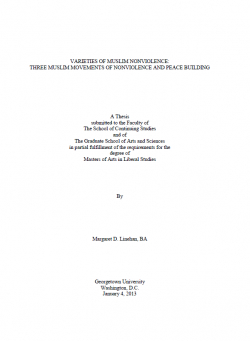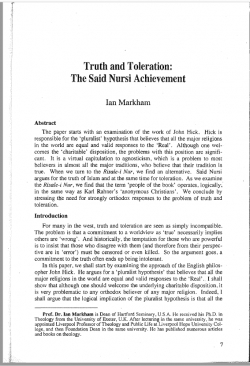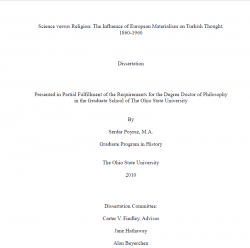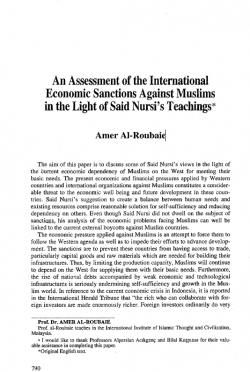VARIETIES OF MUSLIM NONVIOLENCE: THREE MUSLIM MOVEMENTS OF NONVIOLENCE AND PEACE BUILDING

Book Stores
Type
E-Book
Authors
Linehan ( Margaret D. )
Category
Master Thesis - Yüksek Lisans Tezi
[ Browse Items ]
Publication Year
2013
Publisher
Georgetown University, United States
Pages
106
Subject
Liberal Studies
Abstract
Religiously based nonviolence varies in motive, intent and interpretation. John Howard Yoder outlines a variety of religious nonviolence in his book Nevertheless. Muslim nonviolence is not addressed in the book. Identifying a distinctly Muslim understanding of nonviolence requires an appreciation of aspects of peace building that are emphasized in Islam. Muhammad Abu-Nimer has formed a framework for identifying and encouraging nonviolence and peace building in an Islamic context. By applying the basic outlines formulated by Yoder and the framework developed by Abu- Nimer to three cases of Muslim movements of nonviolence, this paper identifies distinct variations of religious nonviolence and peace building that have been developed and practiced by Muslims. The first case is historic; the Khudai Khudmatgar sought independence from Great Britain through nonviolent demonstrations and civil disobedience. The second case puts emphasis on the peace building vision of Islam by examining a movement developed in contemporary Turkey. The followers of Said Nursi and the Gülen Movement collectively support “the middle way”, education in both science and religion and opportunities for dialogue as a means to build peace locally and globally. The third case of religiously based nonviolence practiced by Muslims is that ofthe Shi’a led movement for democratic reforms in Bahrain, which uses collective action and protests to draw attention to the need for social change. Each movement demonstrates distinct approaches to nonviolence and peace building. In each case, the leadership frames the commitment to peace in Islamic terms. And in each case those who commit themselves to the movement do so through their understanding of the way they, as Muslims, should justly relate to one another and the world. This paper demonstrates Islam’s unique characteristics that have enabled Muslims to pursue a common purpose and make change in a nonviolent manner.
Number of Copies
1
| Library | Accession No | Call No | Copy No | Edition | Location | Availability |
|---|---|---|---|---|---|---|
| Main | 212 | 1 | Yes |




